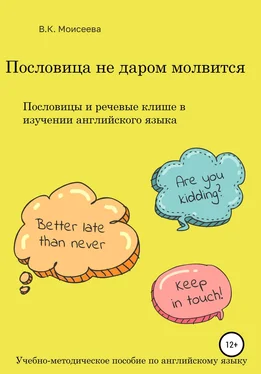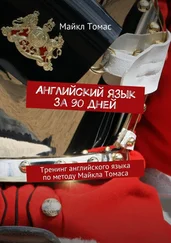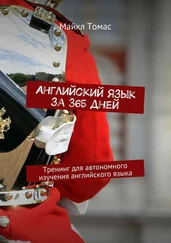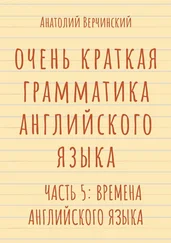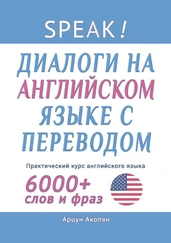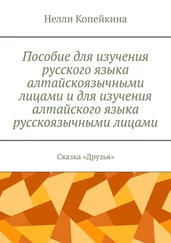Example: Her experience of love has been too bitter and she won’t like to taste it again, for a burnt child dreads the fire. (Thomas and Kelly)
3. Actions speak louder than words: a person is known and judged more by his actions than by his words, however smooth or coarse the latter might appear; actions are more important than words.
Example: "Am I to say nothing?" she stammers. "Nothing! Actions speak louder than words!!" (R. Broughton)
4. A drowning man will catch at a straw: anyone in desperate circumstances tries every possible means oil escape even though he knows it is not likely to be of any teal use. To catch at a straw means to avail oneself of even the slightest chance of rescue from one's difficulties, or to gain hope from the slightest sign that may seem favorable.
Example: Kate, a drowning man catches at straws, you know. I saw you waver just now. (R. Brougtiton)
5. A friend in need is a friend indeed: it is at a time of misfortune that you know your real friends.
Example: I thank you heartily… A friend in need is a friend indeed. (W. G. Smith)
Тask 2. Complete the following proverbs.
1) A friend in need ..................
2) Actions ................. words.
3) ......... ......... in the bush.
4) A burnt .................. fire.
5) .............. .... catch at a straw.
Тask 3. Find English equivalents to the Russian proverbs below.
Не по словам судят, а по делам.
Друзья познаются в беде.
He сули журавля в небе, а дай синицу в руки.
Обжегшись на молоке, дуешь и на воду.
Утопающий за соломинку хватается.
Тask 4. Use appropriate proverbs to fill in the blanks.
1) He had heard that «...........» and he acted. (A. Taylor, B. J. Whiting)
2) You came to my side when I was in trouble ......................... (W. G. Smith)
Тask 5. Find phraseological units and state what proverbs they originate from.
1) Today I am busted and almost beat. I dropped eighty percent of my business all because he put me on his D.D. (demand draft) list. I came up here on a hunch, grabbing at a straw. (R. Robbins)
2) She had closed the house at Hilltop and all her time she spent looking after Arthur, preparing his food, reading to him, or merely sitting in silent companionship by his bed. Strange behaviour for a woman naturally so indifferent, so apparently self-absorbed. It was perhaps an atonement, a clutching at this chance straw of expiation in the throbbing desire to prove that there was something of good in her. (A. Cronin)
3) "There really is nothing as important as giving our town dwellers decent living conditions." ─ "It's rather like going over to the enemy," muttered Michael. "Our future oughtn't to be so bound up in the towns." ─ "It will be, whatever's done. 'A bird in the hand', and such a big bird, Michael." (J. Galsworthy)
4) "I've always liked your mother," Tom went on. "I like the way she's always tried to clutch at straws, and the way she's always been running, trying to catch the bus." (P. Marquand)
Тask 6. Render in English several proverbs of your own language. Use them in situations.
He сули журавля в небе ─ дай синицу в руки.
Друзья познаются в беде.
Утопающий за соломинку хватается.
Пуганая ворона куста боится.
О человеке судят по делам.
Хвататься за соломинку.
Журавль в небесах.
Синица в руке.
Тask 7. Choose the right proverb for the given life situation.
I'm eager to buy a fashionable evening dress for the New Year party. It's so beautiful, but rather expensive. I think it is worth buying. The quality is excellent for the price. But my mother is against it. She says we can't afford it now. We are short of money, because my parents don't get their salary regularly.
а) Cut your coat according to your cloth.
b) A drowning man will catch at a straw.
с) A friend in need is a friend indeed.
Тask 8. Make up a story using one or more of the given proverbs at the beginning.
A bird in the hand is worth two in the bush.
A burnt child dreads the fire.
A drowning man will catch at a straw.
A friend in need is a friend indeed.
Тask 1. Read and translate the meaning of the proverbs using the vocabulary.
Explanatory notes:
1. All's well that ends well: fears and anxieties are forgotten as soon as one's aim is reached.
Example: When the books were signed the vicar congratulated the husband and wife on having performed a noble, and righteous, and mutually forgiving act. "All's well that ends well," he said smiling. (Th. Hardy)
2. A rolling stone gathers no moss: a person who frequently changes his occupation does not attain a position of security, prosperity, success (just as a stone that never stays long in one place gives no chance for moss to grow on it). A person who moves around, never staying in one job, is called a rolling stone.
Example: "I want to see Dan settled somewhere. 'A rolling stone gathers no moss', and at twenty-five he is still roaming about the world without a tie to hold him. (L. Alcott)"
3. Ask no questions and you'll be told no lies: one should not ask inappropriate questions that may lead to deceitful answers.
Example: "What made you part from him?"
"Ask no questions and you'll be told no lies." (Т.А. Hardy)
4. A stitch in time saves nine: a little effort at the right time saves much work later.
Examples:
A Stitch in Time, or Pride Prevents a Fall. (J. Laver)
We take a stitch in time that may save nine. (B. Stevenson)
5. As you make your bed, so you must lie on it: a person must take the responsibility for, and suffer from the results of his own unwise actions, just as a man who makes his bed badly will certainly sleep uncomfortably.
Example: "Stop crying," she says, harshly, "you have made your bed, and you must lie on it." (R. Broughton)
Тask 2. Complete the following proverbs.
1) A rolling stone ...............
2) ............... saves nine.
3) Ask ................ no lies.
4) .................. that ends well.
5) As you make your bed, .........................
Тask 3. Find English equivalents to the Russian proverbs below.
Все хорошо, что хорошо кончается.
Что посеешь, то и пожнешь.
Кому на месте не сидится, тот добра не наживет.
Хороша ложка к обеду.
Не лезь в душу.
Тask 4. In the following passages find proverbs or parts of proverbs, explain their meaning in English and translate the passages into Russian.
1) One can almost hear the formula, "She has made her bed, now let her lie on it." (S. H. Adams)
2) If you do your rolling up-hill you will gather some moss. (B. Stevenson)
3) No one must know ─ certainly not her father, who had warned her so desperately! She had made her bed, and would have to lie on it. (J. Galsworthy)
4) I've been here twenty years myself. I always was one for sticking to a job. I always say when you get a good place, then stick there. A rolling stone gathers no moss, and it's true. (R. Wright)
Читать дальше
